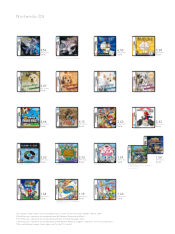Nintendo 2008 Annual Report Download - page 21
Download and view the complete annual report
Please find page 21 of the 2008 Nintendo annual report below. You can navigate through the pages in the report by either clicking on the pages listed below, or by using the keyword search tool below to find specific information within the annual report.17
Risk Factors
Listed below are the various risks that could significantly affect Nintendo’s operating performance, share price, and financial
condition. However, unpredictable risks may exist other than the risks set forth herein.
Note that matters pertaining to the future presented herein are determined by Nintendo as of the end of annual consolidated
fiscal period ended March 31, 2008.
(1) Risks around economic environment
•Fluctuation in foreign exchange rates
Nintendo distributes its products globally with overseas sales accounting for approximately 80% of total sales. The majority of
monetary transactions are made in local currencies. In addition, the Company holds a substantial amount of assets including cash
deposits denominated in foreign currencies without exchange contracts. Thus, fluctuation in foreign exchange rates would have
a direct influence on earnings not only when foreign currencies are converted to Japanese yen but also when revaluated for
financial reporting purposes. Japanese yen appreciation against the U.S. dollar or Euro would have a negative impact on
Nintendo’s profitability.
(2) Risks around business activities
•Fluctuation of and competition in the market
Nintendo’s business is engaged in one segment of the broad entertainment field. However, its business can be affected by
trends in other entertainment fields. If consumer preferences shift to other forms of entertainment, it is possible that the video
game market may shrink. The emergence of new competitors resulting from technological innovation could have a detrimental
impact as well.
In the video game industry, it may become even more difficult to be profitable due to large investments required in research,
development and marketing. In addition, price competition may intensify if additional large enterprises enter into the market. As
a result, Nintendo may find difficulty in maintaining or expanding its market share as well as sustaining profitability.
•Development of new products
Although Nintendo continues to develop innovative and attractive products in the field of computer entertainment, the
development process is complicated and includes many uncertainties. Various risks involved are as follows:
Despite the substantial costs and time needed for software development, there is no guarantee that all new products will be
accepted by consumers due to ever shifting consumer preferences. As a result, development of certain products may be
suspended or aborted.
Development of hardware is complex and time consuming. Technology continuously advances, however, it is possible that the
Company may be unable to acquire the necessary technology which can be utilized in the gaming segment of the
entertainment field. Furthermore, delays of hardware launches could be adversely affect market share.
Due to the nature of Nintendo products, it may become difficult to develop or sell the products as planned, which could lead
to significant variances from income projections.
•Product valuation and adequate inventory procurement
Products in the video game industry are significantly impacted by consumer preferences as well as seasonality characterized by
relatively short life cycles and huge demand around the holiday season. Although production is projected based on the
forecasted equilibrium point of supply and demand, it is difficult to forecast demand accurately, which may lead to excess
inventory. Obsolete inventory could have an adverse effect on Nintendo’s operations and financial position.
























